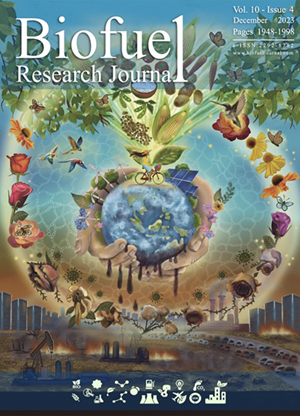乌克兰-俄罗斯危机中粮食和生物燃料市场的不平衡:一个系统思考的视角
IF 11.9
Q1 ENERGY & FUELS
引用次数: 72
摘要
由于俄罗斯在全球供应天然气和化肥方面的重要作用以及俄罗斯和乌克兰在向国际市场出口谷物和油籽方面的广泛贡献,乌克兰战争极大地影响了粮食和能源系统。因此,乌克兰与俄罗斯的冲突导致粮食市场上的作物和谷物短缺,特别是在欧洲,引发了人们的猜测,即这些资源是否仍应用于生物燃料生产(第一代)。然而,国际能源署(iea)警告称,降低生物燃料要求可能导致石油需求和供应担忧加剧。鉴于这些正在发生的事件,需要一种系统思考的方法来监测和分析这场危机对整个粮食和生物燃料市场的影响,以减轻所面临的担忧并进行可持续规划。在这种情况下,基于粮食系统要素和生物燃料供应链之间的权衡,以及战争对全球粮食和能源系统的潜在影响,本研究开发了一个因果循环图。根据所提供的见解,在乌克兰战争期间,防止粮食不安全并同时保持生物燃料要求的增长趋势的关键是从第一代生物燃料转向更高级的生物燃料。这一转变不仅将减轻粮食市场向零饥饿(可持续发展目标2)迈进的压力,还将为战后向循环经济和清洁、负担得起的能源(可持续发展目标7)迈进铺平道路。本文章由计算机程序翻译,如有差异,请以英文原文为准。
The imbalance of food and biofuel markets amid Ukraine-Russia crisis: A systems thinking perspective
The Ukraine war has immensely affected both food and energy systems due to the significant role of Russia in supplying natural gas and fertilizers globally and the extensive contribution of both Russia and Ukraine in exporting grains and oilseeds to the international markets. Hence, the Ukraine-Russia conflict has resulted in a shortage of crops and grains in the food market, especially in Europe, causing speculations if these resources should still be used for biofuel production (1st Generation). However, the International Energy Agency has warned that lowering biofuel mandates could result in rising petroleum demand and supply concerns. In light of these unfolding events, a systems thinking approach is required to monitor and analyze the implications of this crisis for food and biofuel markets as a whole to alleviate the concerns faced and plan sustainably. In this vein, based on the trade-offs between food system elements and the biofuel supply chain, as well as the potential effects of the war on the food and energy systems worldwide, a causal loop diagram is developed in the present work. According to the insights provided, the key to preventing food insecurity and keeping biofuel mandates on an increasing trend simultaneously amid the Ukraine war is to switch from the 1st Generation biofuels to higher generations. This transition would reduce not only the pressure on the food market to move toward zero hunger (SDG 2) but also pave the way to move towards a circular economy and clean and affordable energy (SDG 7) during the post-war era.
求助全文
通过发布文献求助,成功后即可免费获取论文全文。
去求助
来源期刊

Biofuel Research Journal-BRJ
ENERGY & FUELS-
CiteScore
22.10
自引率
1.50%
发文量
15
审稿时长
8 weeks
期刊介绍:
Biofuel Research Journal (BRJ) is a leading, peer-reviewed academic journal that focuses on high-quality research in the field of biofuels, bioproducts, and biomass-derived materials and technologies. The journal's primary goal is to contribute to the advancement of knowledge and understanding in the areas of sustainable energy solutions, environmental protection, and the circular economy. BRJ accepts various types of articles, including original research papers, review papers, case studies, short communications, and hypotheses. The specific areas covered by the journal include Biofuels and Bioproducts, Biomass Valorization, Biomass-Derived Materials for Energy and Storage Systems, Techno-Economic and Environmental Assessments, Climate Change and Sustainability, and Biofuels and Bioproducts in Circular Economy, among others. BRJ actively encourages interdisciplinary collaborations among researchers, engineers, scientists, policymakers, and industry experts to facilitate the adoption of sustainable energy solutions and promote a greener future. The journal maintains rigorous standards of peer review and editorial integrity to ensure that only impactful and high-quality research is published. Currently, BRJ is indexed by several prominent databases such as Web of Science, CAS Databases, Directory of Open Access Journals, Scimago Journal Rank, Scopus, Google Scholar, Elektronische Zeitschriftenbibliothek EZB, et al.
 求助内容:
求助内容: 应助结果提醒方式:
应助结果提醒方式:


